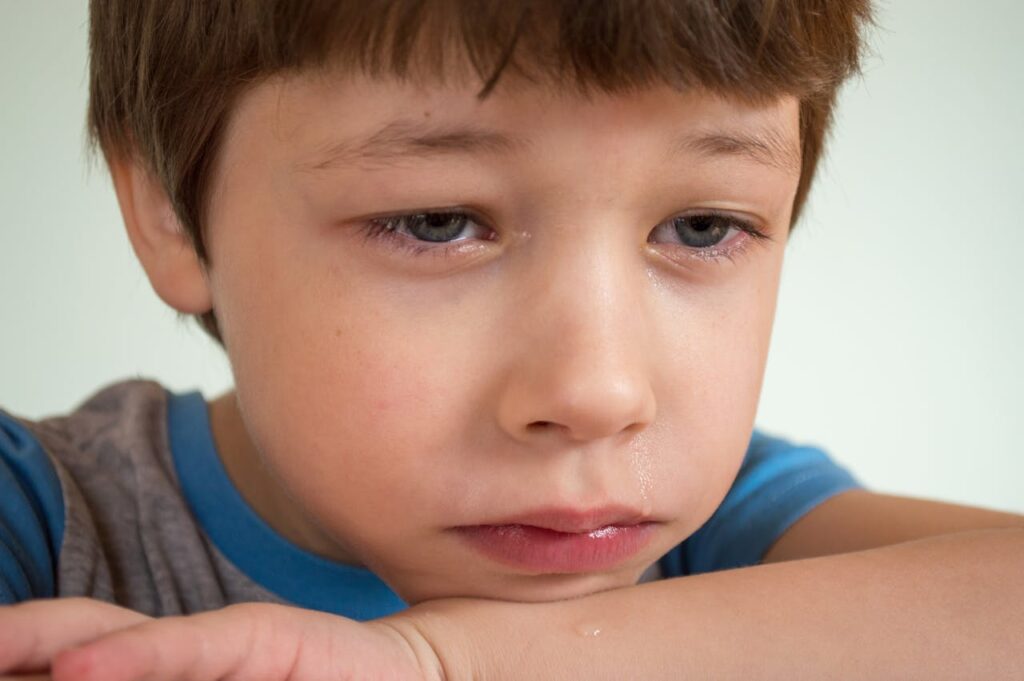Raising a child is a daunting task. Parents tend to move towards one of a number of parenting styles, which range from permissive parenting to strict. Strict parents typically care about their child’s well-being and want what is best for them, but authoritarian parenting tends to stand at odds with more progressive concepts such as self-determination theory.
Parents may choose a more authoritarian style for a variety of reasons, including a more collectivist culture, a family tradition, or a reaction to excessively permissive tactics used by their own parents.
Is strict parenting a good idea? Why are parents so strict? What impact does it have on your child’s development and maturity? Let’s unpack this.
What Does Strict Parenting Look Like?
Strict parents typically set themselves up as authority figures, and often expect their children to obey other authority figures as well, such as teachers or the police. Children are expected to follow rigid rules, often without an explanation as to why those rules are needed. High expectations are also common. A strict parent, for example, may be quick to ground a kid if even one grade drops below an A.
Strict Parent Rules
Strict parents typically set incredibly tight rules. When parents are strict, the rules may be arbitrary and are never open to negotiations. Examples of the kinds of rules strict parents might set include:
- Spending a minimum amount of time on homework even if the child’s teacher gave them the night off.
- Doing chores when and as assigned without negotiating or complaining.
- Not going anywhere with other children or not having certain children as friends.
- Rules about dress that are stricter than those required by the venue, such as insisting your daughter wear a skirt or dress to school.
- Forced involvement in activities chosen by the parent, not the child.
- Insistence on making the bed or doing other chores the correct way. Some strict parents even have rules for how toys can be played with.
The rules can vary, but authoritarian parents typically have a long list of them, some of them petty, such as a precise way to fold clothes. Strict rules about academic performance are also common, even in early childhood.
👉 Curious about your parenting style? Discover more in “What are the different parenting styles?” – read this article now.
How Strict Parents Affect Child Development
An authoritarian parenting style does have an impact on your child’s development, beyond them wondering “why are my parents so strict?” There are some positive impacts, but many more negative ones.
1. Positive Impacts
Good parents do still have rules. Extremely permissive parents are just as bad. An authoritarian parenting style can have some benefits:
- Your child will be more well-behaved, because they have clear expectations and know what they are. This can keep them safer.
- Your child will internalize high expectations and be more goal-driven.
However, these impacts tend not to last into adulthood, and are outweighed by negative effects.

Credits: Pexels
2. Negative Impacts
An excessively strict parenting style interferes with your child’s self-determination and development of autonomy. It can also have some distinct negative impacts:
- Lower academic performance. Paradoxically, having high expectations for your child’s grades can actually lower their performance. Some children will also react to being punished for not getting straight As when they worked hard by working less hard because they feel they can’t make a difference.
- Reduced life satisfaction. Research showed that kids who experienced a purely authoritarian parenting style had lower life satisfaction through youth and into adulthood.
- Reduced self esteem. This may be linked to poor socialization. Kids with strict parents are often denied certain activities with other children, and this impacts their ability to make friends. A child who is never allowed to go to another child’s home, but always has to have kids come to their place may be resented by other children (and even parents) and left out.
- Difficulty making decisions. Because these children have all of their decisions made for them, they don’t learn to make choices in a healthy way. When they leave home they may be paralyzed by the sudden need to make decisions…and may have issues making decisions as simple as what to eat for dinner.
- Tendency to rebel. As kids get older, they react to parents who are strict by working around them, not with them. They are more likely to sneak out and get into trouble than kids raised by softer parents. They learn to conceal the things they are doing. In adulthood they may also rebel against other authority figures, making it harder to hold down a job or even getting them into trouble with the law.
Children who aren’t allowed age appropriate levels of autonomy and competence are likely to turn into adults who don’t have these things and don’t know how to manage on their own. They may also be too permissive with their own children, or even neglectful.
3. Psychological Effects
Can strict parenting cause mental health issues? There are three things to explore here.
Can Strict Parents Cause Anxiety?
Yes. Strict parents can cause social anxiety in adolescents and adults. Children who are not allowed to socialize properly are more likely to be anxious, and reduced self esteem also contributes to social anxiety.
Authoritarian parents can also cause other forms of anxiety. For example, parents who punish a child for being one minute late home from school or missing curfew by one minute are likely to raise a child that is anxious about being late for their entire life and may waste a lot of time by arriving excessively early. High academic expectations can also contribute to error-related negativity that leads to anxiety. This is a fancy way of saying that these children become terrified of making mistakes due to harsh, excessive, or inflexible punishment. This then affects every part of the child’s life and into adulthood.
Can Strict Parents Cause Depression?
Lack of self esteem can easily lead to depression. So can lack of agency caused by children having no input into family activities or even their own decisions. Children may ruminate on things their parents have done, which becomes a risk factor for depression.
There’s little direct research on it, but previous literature does suggest that harsh parenting causes depression, as do poor social interactions with peers. Finally, having to live in a harsh environment on its own can make a child miserable, and that can drift into depression over time. Children who are not allowed to do things their peers can are also at higher risk of being bullied, another risk factor for depression. (They may also be at higher risk of becoming bullies in order to seek control over something, and authoritarian parents undermine social competence).
Can Strict Parents Cause Trauma?
Finally, strict parenting can sometimes be a cause of trauma. Some strict parents will go as far as to withhold basic needs from a child out of punishment. The classic “sent to bed without supper” can easily become abuse.
Not all strict parents are out and out abusive, but it is very easy for an authoritarian style to cross the line, whether it be through the application of corporal punishment or through harsh, out of order punishments that leave children emotionally impacted. In extreme cases, overly strict parenting can cause complex post-traumatic stress disorder (c-PTSD) similar to that found in children who have been physically or sexually abused.

Credits: Pexels
4. Personality and Behavioral Outcomes
Authoritarian parenting actually makes behavior problems worse, especially severe behavioral problems. While there’s a possibility that parents may resort to authoritarian parenting to deal with disruptive behavior caused by other factors, studies correcting for that show that harsh discipline and psychological control cause behavior to worsen. Or the child may be outwardly well behaved…and actually sneaking out every night to smoke a cigarette.
Strict parents also impair the development of social competence in their kids. They are rated lower by teachers, especially boys and younger children. Some of these kids may develop a hostile attribution bias…this means they think the worst of others. Often these kids either become aggressive and start bullying…or they withdraw socially.
However, children raised by strict parents may also develop a stronger sense of self-discipline, they may be more punctual, and they may plan better. Unfortunately, these traits tend to be instilled by fear and hide internalized anxiety.
Impact on the Three Basic Psychological Needs of a Child
All of this indicates that when parents are strict, things happen to children that aren’t good. Why? The reason boils down to the three basic psychological needs we all have according to self-determination theory: Autonomy, competence, and relatedness. So, how are these three things affected by strict parents?
- Autonomy. Children who are raised by strict parents aren’t given a chance to properly develop autonomy. They are often expected to transfer directly from doing what they are told to living on their own. They don’t know how to make their own decisions and run their own lives.
- Competence. These children don’t learn how to be adaptable and flexible. They may become trapped in routines. They are generally poorly prepared for adulthood.
- Relatedness. Social competence is impaired. These children find it impossible to relate to peers and have an unhealthy relationship with their parents and, often, their siblings.
None of the three needs are being properly met and developed, leaving children unprepared for life and with poor emotional well-being.
The Effects of Strict Parenting on the Future Adult
The effects of authoritarian parenting can extend well into adulthood.
First of all, it can impact adult relationships. In intimate relationships, the child may either want or need to be in charge, or feel more comfortable submitting to a partner’s authority. Neither allow for a good give and take in relationships. Children with impaired social competence may grow into socially withdrawn adults. When these children have their own kids, they are likely to be authoritarian because that’s how it’s done in their family, or excessively permissive to “not do it to their own kids.”
Secondly, career and professional development might be impacted. Poor decision-making skills can impair the ability to be promoted into a leadership role. Poor social competence can make it hard to even find a job, as can social anxiety.
Thirdly, the effects of anxiety, depression, and trauma can last well into adulthood. Treating c-PTSD can be difficult and lengthy. Many people raised in these families continue to talk about being afraid of being late, experiencing performance anxiety, or thinking they are worth nothing.
What Strict Parents Think They Are Teaching Vs. What They Actually Teach
Strict parents never see themselves as harming their children. Rather, they think they are teaching them discipline, respect, and hard work. They may also see themselves as protecting their children from “the bad crowd” or other bad outcomes, such as exposure to drugs, alcohol, and sex. They may see outwardly well-behaved children and think they have succeeded.
Some of these children may well learn discipline and hard work. However, the actual lessons learned are often quite different. Children may learn to fear certain situations, including ones that are perfectly healthy and normal. They are often afraid of failure or making mistakes because they perceive or expect extreme consequences. They may internalize punishment and criticism to destroy their self esteem.
Often, too, what these children learn first and foremost is how to evade authority. They become masters at hiding illicit cell phones, lying about where they are going (which often leads to more and more abusive control tactics), and forming conspiracies. Instead of learning to behave, they learn how to hide the fact that they are not behaving. From their point of view, this is only natural.

Credits: Pexels
Self-Determination Theory & Types of Parenting Styles
Self-determination theory is a framework for studying motivation. It says that everyone has three basic psychological needs: Autonomy, competence, and relatedness. We’ve already talked somewhat about how authoritarian parenting tends to impair all three of these needs.
Parenting that takes SDT into account allows for the development of these needs and traits in order to create a better, well-rounded adult. Culture does affect this. Good parenting is different in different places. American parenting, for example, tends to be more permissive than Asian. However, there are four different parenting styles.
Authoritarian Parenting
Authoritarian parenting is what we have been talking about. It conflicts with SDT by not allowing children autonomy and interfering with relatedness. Children lack the freedom to develop self-determination properly.
Permissive Parenting
Permissive parenting means that the child is centered and their needs and desires put first. The problem is that while this develops autonomy, these children don’t learn to obey and handle rules, impacting competence and relatedness. Permissive parents allow the child to be selfish and not develop emotional regulation needed for development.
Neglectful/Uninvolved Parenting
Some parents ignore their kids as much as possible. Uninvolved parents are not just permissive, but cold and distant, denying their children the ability to develop a relationship. These children are impaired in competence and relatedness and in extreme cases this parenting style can constitute abusive.
Authoritative Parenting
This sounds a lot like authoritarian but is very different. Authoritative parents do set rules their kids have to abide by. However, consequences are reasonable and they use rewards more than punishment and children are encouraged to negotiate and work with their parents. This helps foster autonomy and relatedness, allowing children to grow in an age appropriate way.
👉 Ready to foster effective communication? Read why yelling at children isn’t the solution in this article “Parent yelling at child: Why It Doesn’t Work”.
How To Change If You Are a Strict Parent
Some strict parents don’t even realize they are strict. Here are some signs:
- Your child sneaks around and lies to get around harsh discipline.
- You have a zero tolerance policy and don’t accept excuses.
- Your child has more restrictions than most of their friends.
- You have a long list of rules.
- You are nagging your child.
- You don’t offer choices or let kids do things their own way.
- You routinely make over-the-top threats.
If you find yourself doing these things, it’s time to step back and ease off. Do you really need all of those rules? Can your child make the bed differently? Take a deep breath and sit down with your kids to work out how you can renegotiate your relationship. Make sure that consequences have time limits. Never say “you’re grounded” but set a time limit and stick to it.
Why & How to Adopt Authoritative Parenting
The expert consensus is that authoritative parenting is best for your child and also for you. You should be warm and responsive while enforcing standards and expecting cooperation (not submission). All children benefit from an approach that combines respect for them with boundaries to help them learn.
Instead of putting down rules, explain to the child why the rule is there. “You can’t go outside barefoot” becomes “If you go outside barefoot you might step on something and hurt your foot, so let’s not do that.” Children are capable of reason even from a young age.
The biggest tip to move from authoritarian to authoritive, however, is simply to listen to your child. Value their opinions and emotions and allow them to make age appropriate choices, which might start with what to wear or letting them choose one meal a week and move to bigger ones. Make sure that consequences are designed to help kids learn from mistakes, not fear making them.
Overly strict parents can cause real harm to their children. Children then have to learn how to deal with strict parents, and often they come up with coping strategies that are harmful, even dangerous. Shifting to a more authoritative style of parenting is better for your child, especially if you have experience with strict parents yourselves.
Strict parenting impairs child development, especially in the areas of autonomy, competence, and relatedness. If you need more information or support, then don’t be afraid to seek it out so that you can understand your own parenting style and change it for the better. Ready to make a positive change? Join our online masterclass “How to Stop Yelling at Kids” and learn effective, compassionate parenting strategies.
References
Between freedom and fear: Children’s views on home alone. (n.d.). https://www.researchgate.net/publication/240591119_Between_Freedom_and_Fear_Children’s_Views_on_Home_Alone
Chong, L., Mirzadegan, I., & Meyer, A. (n.d.). The association between parenting and the error-related negativity across childhood and adolescence. Redirecting. https://doi.org/10.1016/j.dcn.2020.100852
Ilyas, U., & Khan, S. D. (2023, September 1). Role of parenting and psychosocial correlates contributing to social anxiety in Asian adolescents: A systematic review. Innovations in Clinical Neuroscience. https://www.ncbi.nlm.nih.gov/pmc/articles/PMC10561979/
Li, M., Wang, J., Ma, P., et al. (2023). The relationship between harsh parenting and adolescent depression. Scientific Reports, 13, 20647. https://doi.org/10.1038/s41598-023-48138-w
Martinez-Escudero, J. A., Villarejo, S., Garcia, O. F., & Garcia, F. (2020a, June 16). Parental socialization and its impact across the lifespan. MDPI. https://doi.org/10.3390/bs10060101
Ryan, R. M., & Deci, E. L. (2000). Self-determination theory and the facilitation of intrinsic motivation, social development, and well-being. American Psychologist, 55, 68-78.
Sanvictores, T. (2022, September 18). Types of parenting styles and effects on children. https://www.ncbi.nlm.nih.gov/books/NBK568743/









